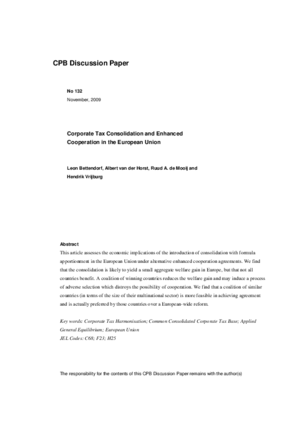November 23, 2009
Corporate tax consolidation and enhanced cooperation in the European Union
This article assesses the economic implications of the introduction of consolidation with formula apportionment in the European Union under alternative enhanced cooperation agreements.
We find that the consolidation is likely to yield a small aggregate welfare gain in Europe, but that not all countries benefit. A coalition of winning countries reduces the welfare gain and may induce a process of adverse selection that reduces the number of participating countries. We find that a coalition of similar countries (in terms of the size of their multinational sector) is more feasible in achieving agreement and is actually preferred by those countries over a European-wide reform.
Downloads
Authors

Albert van der Horst
Ruud de Mooij
Hendrik Vrijburg
